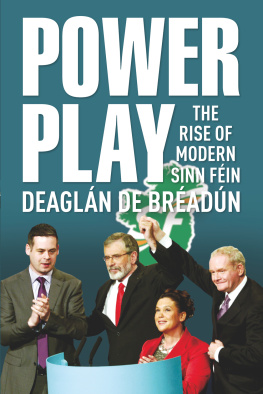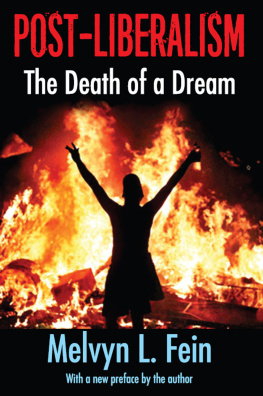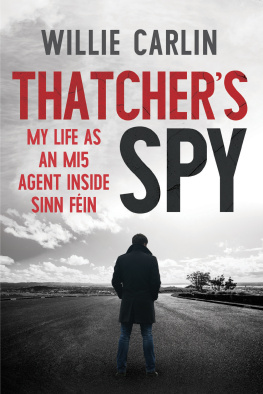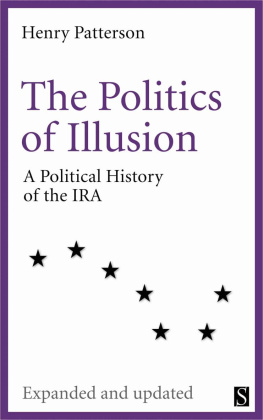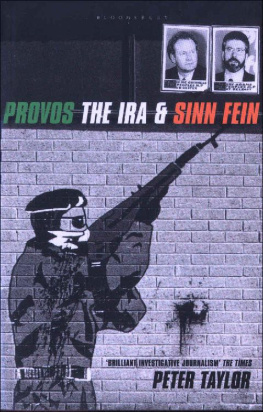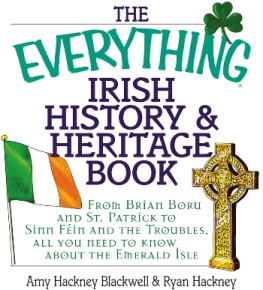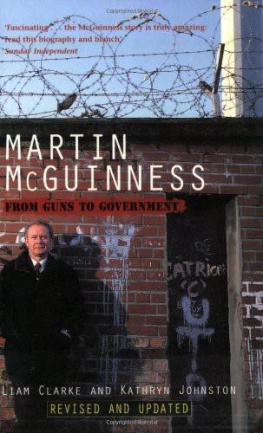First published in 2015 by
Merrion Press
8 Chapel Lane
Sallins
Co. Kildare
2015 Deagln de Bradn
British Library Cataloguing in Publication Data
An entry can be found on request
978-1- 78537-031-1 (paper)
978-1- 78537-033-5 (PDF)
978-1-78537-043-4 (Epub)
978-1-78537-044-1 (Mobi)
Library of Congress Cataloguing in Publication Data
An entry can be found on request
All rights reserved. Without limiting the rights under copyright reserved alone, no part of this publication may be reproduced, stored in or introduced into a retrieval system, or transmitted, in any form or by any means (electronic, mechanical, photocopying, recording or otherwise) without the prior written permission of both the copyright owner and the above publisher of this book.
ACKNOWLEDGEMENTS
This project began in early 2014 when literary agent Peter OConnell approached me to write a book on modern-day Sinn Fin. It was another year before I got down to writing it. Journalistic discretion means that not everyone who helped out can or would wish to be named here but they all know who they are and that my appreciation is genuine. As always, Maria and all the family were unfailingly supportive and encouraging.
Others who gave assistance in different ways include Arthur Beesley, Stephen Collins, Kieran Fagan, Ursula Halligan, Gerry Moriarty, Conor OClery, Fergus OFarrell, Mark Simpson and Irene Stevenson. None of them is responsible for faults in this book.
Some of the interviews were transcribed by Mary Shanahan who was extremely prompt, accurate and professional. On-the-record interviews with Sinn Fin members were facilitated by Ciarn Quinn, Shaun Tracey and Sen Mac Brdaigh. Thanks are also dueto the National Library of Ireland and RT for help in locating archive material.
I wish to stress that no unwarranted slight or insinuation against the character, integrity or reputation of any person or organisation is intended in these pages. Readers who wish to contact me in relation to the content should email ddebre1@aol.com or write c/o the publishers.
1. WE NEED TO TALK ABOUT SINN FIN...
Something is happening here, but you dont know what it is, do you, Mister Jones? (Bob Dylan)
THERE ARE MANY PEOPLE, including members of other political organisations, who dont want to give Sinn Fin a mention, at least not in any way that might allow the party a competitive advantage. Some of them are adherents of Leon Trotsky, but even they would have to acknowledge the truth of their masters dictum: You may not be interested in war, but war is interested in you.
Except, of course, that Sinn Fin is no longer at war. Or rather, it is no longer the propaganda voice of the armed struggle carried out by the Provisional IRA. That campaign is over, according to the Independent Monitoring Commission (IMC), established by the British and Irish Governments as part of the peace process. When I asked the Commissioner of the Garda Sochna (Guardians of the Peace), the Republic of Irelands police force, Nirn OSullivan, on 24 April 2015, if the IMC assessment was still valid, she replied: Absolutely. The report of the International Monitoring Commission, that still stands. They reported that the paramilitary structures of the IRA had been dismantled. Speaking in Dublin to the Association of European Journalists, Commissioner OSullivan added that individuals, who would have previously had paramilitary connections, were currently involved in criminal activity, especially along the border between the two parts of the island. The Commissioner was echoing the words of the IMC. It stated, in its 19th report, issued in September 2008: Has PIRA abandoned its terrorist structures, preparations and capability? We believe that it has. Following two Belfast murders in the summer of 2015 the Commissioner was asked to review the situation for the Government (see also Epilogue).
While the IRA, or individual members, may still allegedly strike out on occasion, the Long War, as the Provisionals called it, is officially over. As a result, Sinn Fin has gone from being the Provos brass band, to becoming a key player in mainstream politics, north and south. Since 1999, with a gap of a few years, Sinn Fin ministers have been part of the power-sharing administration in Northern Ireland. For the last eight years, as the second-largest party in the Stormont Assembly, Sinn Fin has held the post of Deputy First Minister, in the person of former IRA leader Martin McGuinness.
South of the border it is, at time of writing, the second-largestparty in opposition, with 14 out of 166 members in Dil ireann, and three Senators from a total of 60 in the Upper House. This significant but still-modest representation is expected to increase considerably in the next general election, due to be held by 9 April 2016 at the latest. At least, this is what opinion polls have been suggesting for some time. In the last general election, held on 25 February 2011, the party secured 9.9 per cent of first preference votes, under the Irish system of proportional representation. But as it became clear in succeeding months that the new Fine Gael-Labour coalition was implementing similar austerity policies to its Fianna Fil-led predecessor, elements of public opinion began to move towards the Shinners. The average for nine polls conducted by four different companies in the first four months of 2015, for example, was 21.5 per cent.(May to mid-September average is 19.1 per cent.)
This compares with 25 per cent over the same period for the main government party, Fine Gael; 18.3 per cent for the chief opposition party, Fianna Fil; eight per cent for minority coalition partner, Labour; and 26 per cent for Others which includes independents and smaller parties. Indeed one poll, conducted by the Millward Brown company and published in the Sunday Independent in mid-February 2015, had Sinn Fin as the most popular party at 26 per cent, one point ahead of Fine Gael. An Ipsos MRBI poll in the Irish Times in late March had the two parties level, at 24 per cent. The average percentages for May-July were: Fine Gael at 26.25; Fianna Fil at 20.25; Sinn Fin at 19.5; Labour at 7.75; Others at 26.25.
The biggest casualty has been the Labour Party, which scored 19.5 per cent in February 2011 after a feisty election campaign, based on pledges to resist the bail-out terms imposed by the Troika of the European Union, International Monetary Fund and European Central Bank (ECB), following the collapse of the Irish banking system in 2008.
The Labour Party leader at the time, Eamon Gilmore, famously said, in relation to the strictures of the ECB on Ireland, that voters had a choice between Frankfurts way or Labours way. Labour even deployed the slogan Gilmore for Taoiseach during the election, but ended up as the mudguard of the next government it was to be Frankfurts way after all. Two polls at the end of 2014 had Labour at a startling five per cent although the position of the party improved over the following four months.
Poll ratings are not always reflected at the ballot-box. You need the organisational structure on the ground, and people who respond to pollsters dont always bother to cast their votes, or may not even be registered to vote. Fianna Fil got 25.3 per cent support in the 2014 local elections although its average opinion poll ratings had not improved to that extent on the 17.45 per cent that the party received at the ballot-box in 2011. Sinn Fins performance in the locals, in contrast, was below what the opinion surveys had indicated.The party nevertheless did well in the same days European Parliament elections, where


